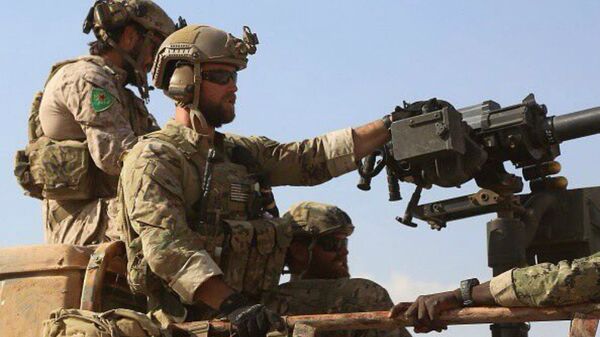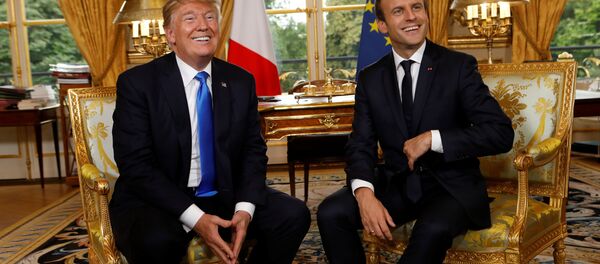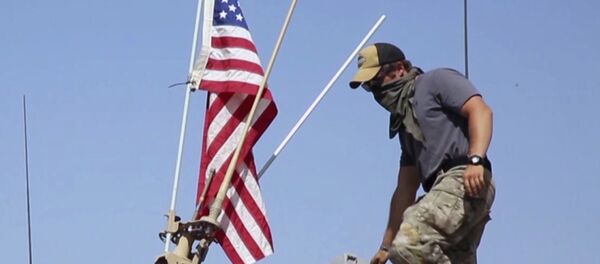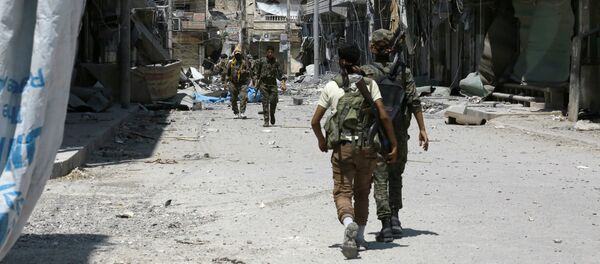"We have already gotten used to US President Donald Trump making a lot of statements which never turn into reality," Dr. Bassam Abu Abdallah, director of the Center for Strategic Studies at Damascus University, told Sputnik Arabic, commenting on Trump's vow to leave Syria "very soon."
"The US armed forces' presence in Syria has translated into the destruction of the country's infrastructure," Abdallah stressed. "[America's] plan for the liberation of Raqqa is an example of deliberate destruction. Washington tries to avoid any international investigation which can expose the current situation in Raqqa and [the US's] actual relations with Daesh [ISIS/ISIL]*. The US wanted to use terrorism to reach their geopolitical goals but it failed due to Daesh's defeat."
However, the US State Department has signaled that it is unaware of Trump's plan to withdraw American troops from Syria.
The US president's remark seems especially surprising in the context of the Trump administration officials' earlier statements that a 2,000-strong US military contingent will still stay in Syria when Daesh is defeated.
Mac Sharkawy, a US political scientist and member of the Democratic Party told Sputnik, "Trump's statement came as a surprise to everyone. The State Department did not know about it either. Besides, there is virtually no coordination between the foreign policy establishment and the Pentagon."
"There is a misunderstanding between Donald Trump, the secretary of defense and the secretary of the interior, which means that the White House is in a state of chaos," Sharkawy opined.
Speaking to Time magazine, Crown Prince Mohammed bin Salman al-Saud of Saudi Arabia emphasized the necessity of the US military presence in Syria.
"We believe American troops should stay for at least the mid-term, if not the long-term," the crown prince said.
Addressing a press conference with the heads of the three Baltic states on April 3, the US president reiterated his intention to bring US troops home: "Our primary mission in terms of that was getting rid of ISIS [Daesh]*. We've almost completed that task and we'll be making a decision very quickly in coordination with others, as to what we'll do. Saudi Arabia is very interested in our decision."
Baris Doster, a political scientist at Marmara University, threw into question Trump's pledge to pull out of Syria. He told Sputnik Turkey that the US had spent a lot on the Kurdish-dominated Syrian Democratic Forces (SDF) and established more than a dozen bases in the Syrian territory.
"To date [the US] has supplied Kurdish formations with 5,000 trucks of weapons, while planning to create a regular 50,000-strong army out of the members of these formations," he said, suggesting that having made such investments, Washington is unlikely to leave the country any time soon.
Bora Bayraktar, a Turkish journalist and Middle Eastern affairs analyst, agreed with Doster highlighting that there is reason for the US to withdraw from Syria at the moment. "I do not think that the US will leave Syria," he opined.
Meanwhile, Trump agreed to keep US troops in Syria "a little longer" during a National Security Council meeting on Tuesday.
"We're not going to immediately withdraw but neither is the president willing to back a long-term commitment," a senior US administration official stated on April 4.
*Daesh, also known as ISIL/ISIS/IS, is a terrorist group banned in Russia and many other countries.
The views and opinions expressed by the contributors do not necessarily reflect those of Sputnik.





